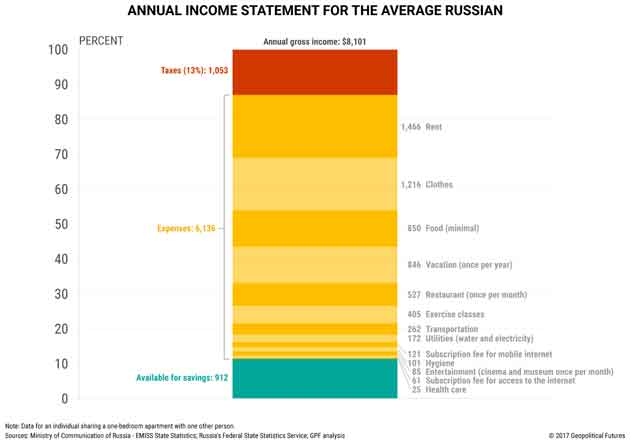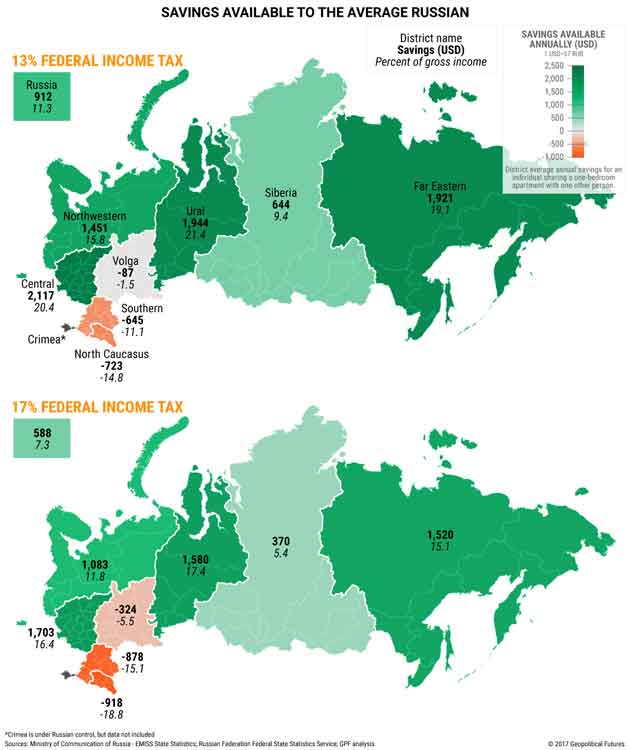| -- | September 11, 2017 Russia Eyes New Sources of Revenue Amid Low Oil Prices By George Friedman, Xander Snyder and Ekaterina Zolotova Low global energy prices have been a strain on the finances of many oil producers, but they’ve hit Russia particularly hard. Oil and gas accounted for 43% of Russia’s government revenue in 2015 and this figure was expected to drop to 36% in 2016, according to the World Bank. But this declining percentage doesn’t mean the government has become less dependent on energy; it’s simply a reflection of low energy prices. And with its financial resources dwindling, Russia’s ability to defend against both external and internal threats will be severely tested. After all, the country will be hard pressed to find the cash needed to fund its defense and social welfare programs with declining revenue from one of its most important industries. As a result, the government will have to find new ways to raise revenue. One option is reforming the personal income tax system. President Vladimir Putin has given some indications that he’s considering changing the current flat income tax rate to a progressive system. Another proposal, which is now being reviewed by Alexei Kudrin, an economic adviser to the president, is to raise the personal income tax rate from 13% to 17%. At the current rate, personal income taxes make up 10% of all government revenue and 18% of all tax revenue. Raising personal income taxes would help the government reduce its dependence on energy. But the government can only make this move if Russians can afford to pay a higher rate. A Model of the Average Russian We therefore decided to stress test Russia’s income tax rate in order to determine how much savings an individual is left with after paying all their expenses. This will help determine whether a 4% hike in the personal income tax rate is feasible. We did this first by constructing a sample budget for an average Russian citizen based on statistics provided by GKS, Russia’s statistics agency. According to GKS, the average annual gross income per person is $8,100. We calculated expenses by adding costs for rent, clothing, food, and certain leisure activities like eating out, going to the movies, and vacation. Food costs are based on the minimal food consumption figures provided by GKS. We also included some healthcare costs for visits to a private dentist and doctor once per year, but since Russia has a public healthcare system and employers typically provide health insurance, we didn’t include the cost of health insurance in our analysis. 
Click to enlarge In our model, rent covers a one-bedroom apartment shared by two people, both of whom contribute to the rent. Based just on this indicator, some regions would have few people with sufficient income left over to cover their monthly expenses. This factor alone reveals some of the inflexibility facing the Russian government. If people are willing to share their apartments with more people—employed adults rather than children or other dependents—then their share of the rent will decrease. But this would mean sacrificing living quality in exchange for greater savings—a tradeoff not everyone is willing to make. Based on this model, the average Russian will have roughly 11% of their gross income left over for savings after paying the current 13% tax rate. This may seem to give the government some leeway to increase income taxes, but Russia is a large country with varying degrees of economic productivity and standards of living. We therefore adjusted income and expenses for each of Russia’s eight federal districts to see the variation in savings for the different districts. We then applied the proposed 17% rate to see how much savings the average Russian would have at the higher rate. At 17%, the average Russian will see savings decline to 7.3% of their income. 
Click to enlarge Vulnerability in the Caucasus A few conclusions can be drawn from the maps above. A 4% increase in personal income taxes wouldn’t necessarily break the bank for the average citizen. But under our model that assumes two people are sharing rent for one apartment, residents in three out of eight federal districts are already unable to pay for their expenses, and all three of these districts are in Russia’s southwest. At a 17% tax rate, at least three people would need to split an apartment in the Volga Federal District to break even. In the Southern Federal District, eight people would need to share an apartment to make it affordable. And in the North Caucasus Federal District, eight people sharing an apartment would still leave everyone in that apartment in the red. This highlights the vulnerability of the Caucasus region in Russia—an area that has historically been a flashpoint not just for Russia but for Europe as a whole. Volga has the second-highest gross domestic product of all the Russian regions. Tatarstan, which is located in Volga, is an area of great economic productivity and is a net contributor to the Russian budget. Yet residents in Volga are struggling to meet their expenses, and those outside Tatarstan are likely even worse off than what our map indicates for the average Volga resident. The districts with the highest savings rates under the current tax scheme are the Ural, Central, and Far Eastern districts, which have 21.4%, 20.5%, and 19.1% of their total gross income left over for savings respectively. The Ural district contains more than 60% of Russia’s oil reserves and 75% of its natural gas reserves. The Central district includes Moscow, an economic hub for the country. The Far Eastern district, Russia’s largest by size, is its smallest by population. While economic development remains limited in the district, it is rich in minerals and other natural resources. Weighing the Risks Russia appears to have some flexibility to increase personal income taxes, at least in some regions. It’s unclear if different tax rates would be applied to different locations under the proposed changes but even wealthy regions are likely to oppose the reforms. Tatarstan’s President, Rustam Minnikhanov, has tried to form a coalition between the former autonomous republics against tax hikes imposed by Moscow, but to no avail. Ultimately, a tax hike is just one way the government can reduce its dependence on energy and raise funds while oil prices are low. Although oil and gas still make up a significant portion of the government’s revenue, that portion is declining. This move wouldn’t come without some risk, however. Hiking taxes could dampen domestic demand and even result in unrest in wealthier regions. But the alternative—continuing to depend on a resource whose declining value has no end in sight—may be an even bigger risk. 
George Friedman
Editor, This Week in Geopolitics
 | Prepare Yourself for Tomorrow with George Friedman’s This Week in Geopolitics
This riveting weekly newsletter by global-intelligence guru George Friedman gives you an in-depth view of the hidden forces that drive world events and markets. You’ll learn that economic trends, social upheaval, stock market cycles, and more... are all connected to powerful geopolitical currents that most of us aren’t even aware of. Get This Week in Geopolitics free in your inbox every Monday. |
Share Your Thoughts on This Article

Not a subscriber?
Click here to receive free weekly emails from This Week in Geopolitics.
Use of this content, the Mauldin Economics website, and related sites and applications is provided under the Mauldin Economics Terms & Conditions of Use. Unauthorized Disclosure Prohibited The information provided in this publication is private, privileged, and confidential information, licensed for your sole individual use as a subscriber. Mauldin Economics reserves all rights to the content of this publication and related materials. Forwarding, copying, disseminating, or distributing this report in whole or in part, including substantial quotation of any portion the publication or any release of specific investment recommendations, is strictly prohibited.
Participation in such activity is grounds for immediate termination of all subscriptions of registered subscribers deemed to be involved at Mauldin Economics’ sole discretion, may violate the copyright laws of the United States, and may subject the violator to legal prosecution. Mauldin Economics reserves the right to monitor the use of this publication without disclosure by any electronic means it deems necessary and may change those means without notice at any time. If you have received this publication and are not the intended subscriber, please contact service@mauldineconomics.com. Disclaimers The Mauldin Economics website, Yield Shark, Thoughts from the Frontline, Patrick Cox’s Tech Digest, Outside the Box, Over My Shoulder, World Money Analyst, Street Freak, Just One Trade, Transformational Technology Alert, Rational Bear, The 10th Man, Connecting the Dots, This Week in Geopolitics, Stray Reflections, and Conversations are published by Mauldin Economics, LLC. Information contained in such publications is obtained from sources believed to be reliable, but its accuracy cannot be guaranteed. The information contained in such publications is not intended to constitute individual investment advice and is not designed to meet your personal financial situation. The opinions expressed in such publications are those of the publisher and are subject to change without notice. The information in such publications may become outdated and there is no obligation to update any such information. You are advised to discuss with your financial advisers your investment options and whether any investment is suitable for your specific needs prior to making any investments.
John Mauldin, Mauldin Economics, LLC and other entities in which he has an interest, employees, officers, family, and associates may from time to time have positions in the securities or commodities covered in these publications or web site. Corporate policies are in effect that attempt to avoid potential conflicts of interest and resolve conflicts of interest that do arise in a timely fashion.
Mauldin Economics, LLC reserves the right to cancel any subscription at any time, and if it does so it will promptly refund to the subscriber the amount of the subscription payment previously received relating to the remaining subscription period. Cancellation of a subscription may result from any unauthorized use or reproduction or rebroadcast of any Mauldin Economics publication or website, any infringement or misappropriation of Mauldin Economics, LLC’s proprietary rights, or any other reason determined in the sole discretion of Mauldin Economics, LLC. Affiliate Notice Mauldin Economics has affiliate agreements in place that may include fee sharing. If you have a website or newsletter and would like to be considered for inclusion in the Mauldin Economics affiliate program, please go to http://affiliates.ggcpublishing.com/. Likewise, from time to time Mauldin Economics may engage in affiliate programs offered by other companies, though corporate policy firmly dictates that such agreements will have no influence on any product or service recommendations, nor alter the pricing that would otherwise be available in absence of such an agreement. As always, it is important that you do your own due diligence before transacting any business with any firm, for any product or service. © Copyright 2017 Mauldin Economics | -- |
